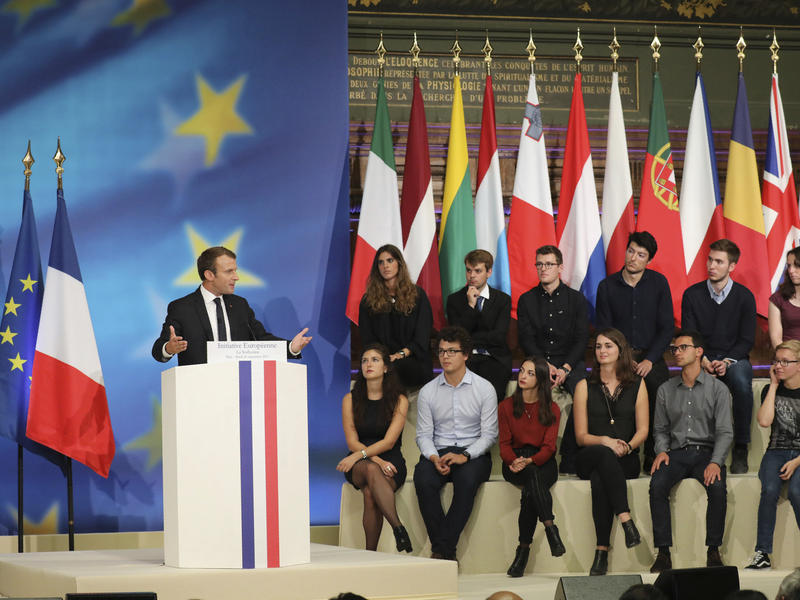President Emmanuel Macron laid out his vision for Europe in a major speech at the Sorbonne yesterday. This speech was billed as an Initiative for Europe and set out the President’s ambitions in a range of areas – defence, counter-intelligence, asylum and migration policy, an external policy focused on Africa and the Mediterranean, a sustainable development agenda (including ideas for a more flexible CAP), addressing the challenges of the digital economy, reforms of the eurozone, and institutional reform. He proposed that each Member State that signs up to this agenda (recognising that not all will want to) should organise a citizen’s dialogue in the coming months with a view to feeding into a new “group for overhauling Europe” which would be tasked to produce a report by Summer 2018 on measures to implement these ambitions.… Read the rest
Food safety in the US-EU TTIP negotiations
There is widespread concern that the ongoing negotiations on a transatlantic free trade area between the US and the EU, known as the Transatlantic Trade and Investment Partnership (TTIP), may result in a watering-down of EU food safety standards under US pressure to remove measures which are perceived as barriers to trade.
According to a report from the US-based NGO the Centre for Food Safety, “many analysts believe that a central aim of the negotiations is to dismantle many food safety regulations that corporations view as impediments to trade and profitmaking.”
Less dramatically, the European Consumer Organisation BEUC notes in its position paper that: “[…] the EU food legislative framework guarantees consumers a high level of protection and information.… Read the rest
Food safety – the Irish pork dioxin crisis revisited
An Irish Parliamentary Committee has just published the results of its investigation into the pork dioxin crisis in Ireland last December, which led to the slaughter of pigs on a number of farms which had been fed contaminated feed and the recall of all Irish pork products produced since 1 September from the home and export markets. In an earlier post, I provided some background to the crisis. I argued that the contamination incident raised three questions: how was it that the praised EU hygiene controls broke down in this instance? What will be the overall cost to the sector and to the economy of the dioxin contamination and the product recall? … Read the rest
Prospects for GMO products in the EU
After the forceful and successful management of the agricultural dossier by the French Presidency in the second half of 2008, it was inevitable that the agenda for the Czech Presidency would be a light one, and this is also reflected in the activity level for this blog since the beginning of this year.
Nonetheless, even in a context where most attention is focused on dealing with the financial crisis and the strengthening recession hitting Europe, Europe’s agricultural and food industries continue to be required to address regulatory issues affecting the governance of the sector. One of these issues concerns the regulatory environment for genetically modified products (GMPs), and I am indebted to EurActiv for drawing my attention to the outcome of a meeting of the Environmental Council in early December which gave a series of political directions to the Commission on this issue.… Read the rest
More on Irish pigmeat compensation
The European Council at its last meeting under the French Presidency on 11-12 December had a weighty agenda, discussing the EU energy and climate change package, the European economic recovery plan and agreeing with the Irish government an approach which might allow the Lisbon Treaty to enter into force before the end of 2009. The Council also welcomed the political agreement on the CAP Health Check and, in a move surely made with one eye on the upcoming second referendum in Ireland on the Lisbon Treaty, it “expressed its support for Ireland’s effort to deal with the situation relating to pigmeat and its prompt precautionary action.… Read the rest
Food safety rules as protection or protectionism?
SPS (sanitary and phytosanitary standards) barriers figured prominently in the final Agricultural Council of 2008 under the French Presidency. Agricultural Ministers agreed Council Conclusions on the safety of imported agricultural and agri-food products and compliance with Community rules. At the same meeting, EU Farm Ministers rejected a Commission proposal to allow the use of antimicrobial substances to treat poultry carcasses, which would have re-opened the Community market to US imports. Is there a danger that food safety protection becomes an excuse for protectionism?
Questions from Irish pigmeat contamination crisis
Europe’s lastest food safety incident stems from the confirmation of elevated levels of dioxins in Irish pigmeat last Saturday. As a result, all Irish pork and bacon products from pigs slaughtered in Ireland since 1st September 2008 have been recalled. Consumers have been advised, as a precautionary measure, not to consume Irish pork and bacon products at this time and to dispose of any purchased since the 1st of September 2008. The discovery of this contamination – which has been sourced back to a small feed mill recycling bakery and confectionery waste for animal feed – is a calamity for the Irish pig sector and could yet have major adverse consequences for the Irish food processing sector as a whole.… Read the rest

